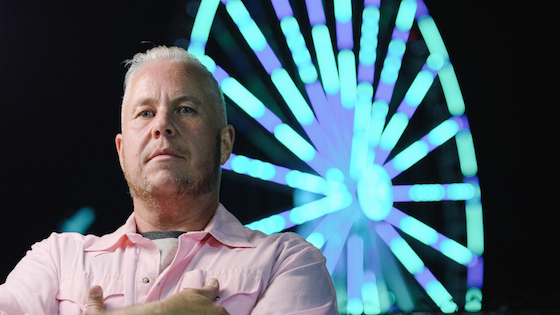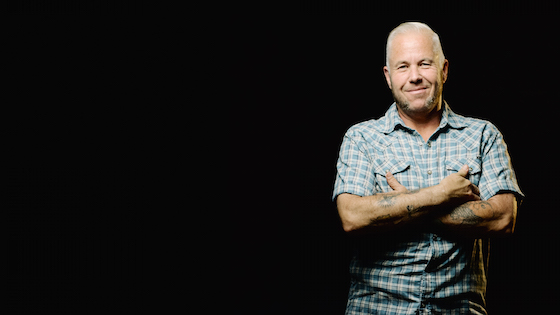[Minor Rock Fist Up]
Finding Kim is a bio-doc about trans culture, and one particular man’s struggle to emotionally and physically come to terms with his true gender identity. Making its premiere at this year’s Seattle International Film Festival, Finding Kim and its director, Aaron Bear, just happened to land in the middle of a particularly hot political season that has put trans rights center stage. This is a timely coincidence, too, for if it does nothing else, Bear’s film humanizes a contentious issue that people sometimes forget has a very real and personal component attached to it. This is a small victory in and of itself, for like any good, responsible movie dealing with a contentious social issue like abortion, drug decriminalization, or the death penalty, one that talks about LGBT rights needs to elevate the topic above the purely political.
Opening in the Pacific Northwest, Finding Kim introduces its audience to its namesake, a forty nine year old female-to-male trans person who has just begun testosterone therapy. Kim talks about his early life, which included a lot of confusion, depression, and bullying because of his discomfort as an identified female. Over time, Kim found solace in a new community, Seattle, where he felt embraced for who he was, and wanted to be. Like so many trans people, Kim struggled with the conflict between his outward appearance and his sense of self, along with a fear that when the two finally synched up, those he cared about might not accept the transition.
The documentary contextualizes Kim’s story by weaving it into a narrative as told by other trans people (both M2F and F2M), a doctor specializing in trans surgery, and noted sex advice columnist Dan Savage. It paints a picture of a trans community whose struggle for things like bathroom rights pales in comparison to the Herculean battle they’ve waged with themselves regarding who they truly are. Their struggle is all about feeling like they belong, like they are normal people just like everyone else. To deny these people protection against discrimination seems ludicrous, then, for what they really seem to want, more than anything, is to fit in and live normal, unconflicted lives. This hardly seems like something worth pitching a fierce political battle over, yet here we are.
Kim’s story plays out like an all too timely microcosm of a larger issue dominating the social and political discussion in the U.S., for his transition into the man he’s always wanted to be offers the audience the aforementioned human face this discussion deserves. The moments when Kim speaks with a tremble in his voice about revealing his transition to his parents, or discusses an upcoming procedure to have his breasts surgically removed ring with unmistakable truth. Yet, really, this only scratches the surface of who Kim is as a person, for every time Bear’s documentary approaches a moment of raw honesty, it inches back from the ledge.
Although it is a fascinating look at trans culture through the lens of one particular individual, by the end of the 85-minute runtime, the audience does not, despite the title, really find Kim. While it may be true that Kim found himself by the end of the documentary, which is indeed something to celebrate, there is never really a deep dive into who he is outside of his struggle to reconcile his notion of self and body. Except for the fact that he enjoys dancing, everything the audience learns about Kim (i.e. relationships, the depression, his life story) is anchored in the gender identity struggle. There is abundant evidence throughout the film that Kim, even at 50, struggles with the fact that he has not opened up to his parents about who he is, and wants to be. On a few occasions, Finding Kim creeps towards a breakthrough on this front, yet diverts instead back to the physical transition that dominates the narrative.
Throughout the documentary, this transition remains front and center, making this less of a human story, and more of a medical one. This is a shame, too, because the audience only gets a look at one side of Kim, and that’s the clinical one. And while a celebration of Kim’s courage throughout the transition isn’t inappropriate, it would have been all the more impressive if channeled through a confrontation with someone not so clearly on his side. Regardless of whether Kim’s family reacted with acceptance or a challenge, the result would have been a moment that pushed the subject matter into a whole new level. So too would a deeper dive into the reasons why Kim seems to be in a long-term relationship throughout the first half of the documentary, and then very much single in the latter portion.
Who is Kim outside of this struggle to properly define his gender identity? Although Finding Kim does a great job filling in the blank spaces of its primary subject’s life with friend interviews, along with other transitioned folks, the answer to this question remains elusive. And while this doesn’t make it a bad film, or even a less than good one, it does lead a person to wonder what was left on the table.








{ 2 comments }
Hi there, while I appreciate your words, as the subject of said film I have of course my own perspective. I was indeed NOT in a long term romantic relationship of any kind, nor even a short term one, throughout the filming. I have been single for almost ten years. In regards to your comments of not finding me by the end, I understand. Little is said about my personal life nor the many struggles it took me to transition as far as details such as name change and the massive paperwork, regular denial of healthcare, etc. one cannot have a film that includes everything, and it was their vision to do it more broadly. That’s ok! The last thing I’d point out is that you wanting a “confrontation” with someone so ” not on my side”… Well you can get that stuff on Jerry Springer I suppose. Or script it. This film was not scripted at all. No one forced or even asked me to do anything I wouldn’t have been doing already. I’m very glad my good friend made this film because I would not have done it otherwise. This was a very personal project by a friend. And I love it.
I appreciate the feedback, Kim! Sorry if I misunderstood your relationship status in the film – I thought the doc. implied that you were in a relationship early on. Honest mistake, truly. As for the rest, I really did think the film was enjoyable, and despite any quibbles I might have, I think the doc. is a responsible, insightful portrait of the trans community, hence my positive review. My takeaways were just one person’s opinion, obviously, so to each their own. = )
Comments on this entry are closed.